- Home
- Joan Lowery Nixon
Ellis Island: Three Novels Page 6
Ellis Island: Three Novels Read online
Page 6
“What chutzpah!” Rebekah snapped in anger. “You are a yold if you think I’m looking for a husband!”
Nessin chuckled, not the least bit bothered by her insults. “Then there’s no problem,” he said. He turned from the rail, adding, “I’m going to walk up near the prow.”
“You’ll get drenched.”
“Want to come with me?”
“No!” Rebekah shouted after him.
Sofia hung on to the rail, intent on watching the whitecaps on the water, squealing each time the breeze splattered them with cold spray, so Rebekah had time to think. As she had told Nessin, she was not in the market for a husband—certainly not at the age of fifteen—so why did she suddenly have such a heavy lump of disappointment in the pit of her stomach?
Was it because a boy could be looked down on for what other members of his family did, even though he had no responsibility for their actions? Would his friendship, his kindness, his tender smile, and his beautiful music count for nothing with any respectable Orthodox family because his family didn’t obey Orthodox Jewish law?
Rebekah let out a long sigh, but an idea suddenly sparked in her mind with such brightness that her discouragement disappeared. Everything in the United States seemed to be different from the way it was in Russia. Very well, then, maybe Aaron’s position would be different, too. Mordecai had told Rebekah that the United States was a country of self-made men who valued independence, so maybe whatever Aaron made of himself would be all that was considered.
Maybe … in the United States even the way marriages were arranged would be different. Maybe … a woman could choose the man she wanted to marry. Maybe she wouldn’t have to get married at all if she didn’t want to! Rebekah choked back a laugh.
Sofia looked up. “Rebekah?” she asked. “Are you all right?”
“I’m fine,” Rebekah answered. “I just realized that all of a sudden I’m actually looking forward to arriving in the United States, too.”
CHAPTER NINE
IT was not until evening that the sea calmed and the voyage became more smooth. Rebekah, Kristin, and Rose, congratulating themselves for not getting seasick, had lots of time to chat about the lives they had left behind and to speculate about what their lives would be like once they reached the United States.
“My Uncle Avir told Father it is easy for a man to make money if he is willing to work hard,” Rebekah told them.
“My father said the people who make money have to know the right people,” Rose said.
“My father says a man can grow wealthy if he owns enough land,” Kristin added.
The three girls automatically looked up to the top deck.
“I wonder what it would be like to be wealthy and travel only in first class,” Rose murmured.
A voice broke in, and Rebekah turned to see Rose’s Uncle Jimmy grinning at them. “You’d have your own stateroom with electric lights instead of lanterns,” he said, “and jewels and silk gowns to wear, and far better food than we’ve been getting in steerage.”
He swept his hat before them in a deep bow, plopped it jauntily on his head, and left, still grinning.
“Your uncle’s in good humor,” Kristin said to Rose.
“He always is,” Rose said, “even when you’d rather he’d just calm down a bit.”
Rebekah glanced at some newly washed clothes that had been hung out to dry on lines strung near the stern. “If we were wealthy, there’d be someone to do our laundry for us,” she said.
Kristin decide to make it a game. “We’d wear big hats to keep off the sun and sit in those lounge chairs we saw on the top deck.”
“And do nothing all day long,” Rebekah said. She began to laugh. “I’d hate having nothing to do. Wouldn’t that be boring?”
“It would be better than milking cows at five o’clock in the morning,” Kristin answered.
“You’d have lots of other wealthy people around you so you could all do nothing together,” Rose said.
As the three girls laughed, Rebekah thought how glad she was that Kristin and Rose were on the ship, too. The two weeks at sea wouldn’t seem nearly as long as it would have without them.
For the next three days many of the passengers enjoyed being out in the fresh air, so the main deck was crowded. Rebekah took turns with her mother in caring for Jacob, and valued the time she was free to enjoy the brisk air on deck.
Rose was almost always free to do as she pleased, and Kristin seemed to want to spend as much time as possible away from her parents, so the three girls were often together. But during the times when Kristin and Rose were not at hand, Aaron would suddenly appear, and Rebekah began to feel at ease with him, happy in his company.
“What will you do when you reach the United States?” she asked him.
Aaron picked up his flute and studied it. “My father works in a clothing factory. I’ll have a job there, too.”
“What about your music?”
“I’m not a trained musician. My flute is only for my own pleasure.”
“And mine.” He looked so pleased that Rebekah smiled and added, “Maybe in the United States you can study music. Russian music is so beautiful. Maybe in the new country people will want to hear it.”
“It takes money for lessons, and factory jobs don’t pay that well.”
Rebekah thought about the education she wanted so desperately. “I believe,” she said slowly, each word a promise to herself, “that if you truly want something and you’re willing to work for it, then nothing can stop you from getting it.”
“How about a father who wants only your paycheck?”
Rebekah turned and urgently grasped the rough fabric of Aaron’s coat in both fists. “There’s freedom and opportunity in the United States! If you love your music, then you should fight for it! You can’t give up! I won’t let you!”
Aaron clasped Rebekah’s hands and held them firmly as he studied her with an expression both joyful and solemn. “Do you care that much about me, Rebekah?” he asked.
“You’re my friend. I care about all my friends.”
“Is that all I am—a friend?”
“Aaron,” Rebekah answered firmly, “I am only fifteen. I am too young to even think of … of anything beyond friendship.” The look in his eyes told her this wasn’t answer enough. She recited the words she had so often heard: “When my parents decide that I’ve reached the proper age, they’ll find a suitable husband for me.”
Aaron let go of Rebekah’s hands and sighed. “You tell me to work for what I want, but you are willing to have other people plan your life for you. Doesn’t the new country hold any freedom and opportunity for you?”
When she didn’t answer immediately, Aaron stepped back and strode across the deck to the open hatchway leading to the hold.
Rebekah’s mind churned, and she clamped her hands on each side of her head, as though she could hold her thoughts in place. There must be freedom and opportunity for everyone who came to the United States, but she would have to see it for herself. Didn’t men receive a larger share of it than women? Hadn’t this always been the way of the world? Could the United States really be any different?
On the fourth day out of Liverpool the wind blew hard enough to stir up good-sized waves, slamming them against the ship, and it began to rain. Within minutes the rain beat down in torrents, and the wind howled and shrieked louder and more persistently than the ship’s rasping horn.
Those passengers still above the hold rushed toward the open hatchway, slipping and sliding on the slick decks. A few stragglers followed them only when sailors ordered them down into the hold for safety’s sake.
Rebekah was one of the stragglers. She had been in the hold earlier to sit with Jacob, and when Leah had come to take her place, Rebekah had rushed out of the foul stench of the place, gulping in the cold, wet air.
Halfway down the stairs she looked back and saw four sailors lift the hatch cover, struggling against the wind.
“What are you doin
g?” Rebekah screamed at them.
“We have to bolt this down,” one of the sailors said.
“You can’t! The smell! The …”
“We have to, for your own safety,” he yelled back, and the hatch cover fell into place.
Rebekah could hear the bolts being fastened, and she shivered. All the steerage passengers had been crammed into the hold and were locked in. They couldn’t get out! Even if the ship were to sink!
The ship rolled violently, throwing Rebekah off balance, and she skidded on the slippery stairway, bouncing down a couple of steps until she stopped herself by catching the handrail and clinging to it. Her legs were so wobbly she couldn’t stand, and she broke into a sweat as she thought of being trapped in the hold. The lanterns swung wildly, casting crazy, leaping shadows, and here and there Rebekah could hear the sound of retching and vomiting.
Bile rose in her throat, and she clapped a hand over her mouth, forcing it down. The stink in this place was enough to make anyone ill, and the irregular pitching of the ship added to the horror.
Enough! She was wasting time. Her family might need her.
Rebekah had no sooner reached her family’s bunks than the ship seemed to rise in the air, stagger, then slam to the water with a crash. Sharp cries and shrieks of terror echoed throughout the hold. To keep from falling, Rebekah clung to the post that supported the upper bunk, and as the ship steadied itself, she found a sure hold.
Her mother had tumbled to the floor and was sitting spraddle-legged, her face white with fear. Jacob moaned, Sofia began a high-pitched wail, and Nessin, who clung to one of the top bunks, stared at Rebekah with frightened eyes.
“Mama, are you hurt?” Rebekah asked as she held out a hand to help her mother up.
“The ship is sinking,” Leah whispered.
“No, it isn’t,” Rebekah answered. Not yet. She cast an eye toward Elias and Mordecai, who were huddled on one bottom bunk. Draped in their prayer shawls, siddurs held close to their faces, they read the prayers aloud.
Rebekah struggled to keep her balance as the ship rocked. “Mama, sit here—at the end of the bunk,” she ordered. “Hold on tightly.”
“Jacob …”
“Jacob will be all right where he is.”
“Sofia?”
“Here she is.” Rebekah snatched her little sister up from the bunk where she’d been cowering and thrust her under her mother’s arm. Mother and daughter clung to each other.
Up rose the ship again, to the sound of screams and shouted prayers, and Rebekah hugged the bunk support tightly, squeezing her eyes shut as the ship dropped with a crash against the churning water.
As the ship steadied itself and rolled, Rebekah opened her eyes and found herself looking directly into Kristin’s.
“I’ll never do another wicked thing as long as I live!” Kristin moaned.
“There’s water in the hold!” someone screamed. “The ship is sinking!”
“No, it’s not!” Rebekah shouted. “It’s not, it’s not, it’s not!”
The hatch cover was suddenly removed, and a group of sailors wrapped in huge, black, oiled raincoats flapped down into the hold like giant bats. While some of them turned on the bilge pumps, others set up a bucket chain and drained the water that had seeped in and spread over one end of the hold.
They worked quickly and efficiently, then were gone, the hatch cover bolted back into place. The storm continued, and the ship raised high and slammed down, raised and slammed, over and over and over again.
A man staggered halfway up the steps and beat with his fists against the hatch cover. “Let me out!” he shouted. “I want to jump into the sea! I want to die! I can’t stand this any longer!”
But the ship lurched, throwing him off balance, and he rolled down the steps, vomiting where he lay.
“We’re all going to die!” someone cried.
“No, we’re not,” Rebekah insisted. She shut out the wails and cries and retching noises that filled the hold, wondering to herself why she was so positive they would all survive.
She thought about her conversation about freedom and independence with Aaron. She knew now what they meant in her life. She was going to the United States. She was going to go to school. She—Rebekah—was going to have an education and make something of herself. Nothing was going to get in her way.
As the storm went on, Rebekah lost track of time. She knew only that days were passing. Once when there seemed to be a lull in the noise and movement of the ship, she was sure that the worst was over, but it started again. She curled into one of the bottom bunks, dozing until she was awakened by the rolling ship flipping her to the floor.
Finally, gradually, the heaving of the big ship grew less and less powerful, until it settled into a steady roll. Rebekah awoke from sleep to hear people talking instead of moaning. Passengers began climbing from their bunks with surprised expressions on their faces, stretching and studying their arms and legs, as though making sure they were still in place.
The hatch cover was removed, and fresh air and golden afternoon sunlight streamed through. Deck-hands came down with rags and buckets, handing them out to the steerage passengers, so they could clean up the mess that covered the floor. The vile-smelling contents of bucket after bucket were emptied overboard, and the deck was swept down.
When all was in order again, and clothes and bedding had been laid outside to air and dry, the hungry passengers ate. After the meal, Rebekah found Aaron by following the gentle sound of his flute. He sat behind one of the funnels, and although the deck was cold and still a little damp, Rebekah sat down next to him.
He looked at her and smiled. “One of the sailors told me that the storm lasted two and a half days,” he said. “It seemed more like two and a half weeks.”
He played a short trill on his flute, and Rebekah listened. When he took the instrument away from his lips, she said, “I made a promise to myself during the storm. When I get to America I’m going to have an education and make something of myself. That’s what this journey is all about for me.”
Aaron’s smile was endearing. “I thought about what you urged me to do, too,” he said. “I won’t give up my music.”
Rebekah held up the little finger on her right hand and crooked it. “Give me your little finger,” she said. When Aaron’s little finger was crooked inside hers she told him, “We’ve made a promise to ourselves and to each other. Make a wish, and this will seal it.”
Aaron took a deep breath and said, “I know that Nessin must have told you about my family. Someday I’ll show up on your doorstep, Rebekah, and your parents won’t send me away.”
Rebekah looked up into Aaron’s eyes. Then she tightened her finger and gave another tug. “Make your wish,” she said. “God will help us face the future.”
CHAPTER TEN
THE voyage continued. The relatively smooth weather made Rebekah and the other passengers in steerage thankful that the ship was still afloat so they accepted the occasional closing of the hatches in choppy seas without complaint. But many passengers did complain about the water, which began to taste sour, and about the meals, which became progressively more meager.
The smell of unwashed bodies and clothes grew more ripe, but it was understood that it would be impossible for any of them to be really clean until they had left the ship.
Three passengers in steerage grew so ill that they died during the voyage. At each death Rebekah joined in the united mourning. Common bonds had made these strangers a family, grateful that for a while the occasional noisy disagreements and arguments spawned by the miserable living conditions had been set aside.
During the voyage Rebekah, Rose, and Kristin felt closer and closer in friendship. It was not until a ship’s officer announced they’d be arriving in New York Harbor the next morning that the girls spoke of leaving each other.
“Surely the United States can’t be so big that we won’t see each other again,” Rose said. “No matter how far apart we live, we’ll meet
each other someday, and in the meantime we’ll write letters—many, many letters.”
“I’ll write and tell you all about our farm,” Kristin said. “You can come and visit. I’ll teach each of you how to milk a cow.”
“We know how to milk a cow,” Rebekah and Rose answered in unison, then burst out laughing.
Tears glistened in Kristin’s eyes as she said, “First I had to leave my grandmother. I didn’t think on this ship I’d make such good friends. We will see each other again. I know we will.”
“Of course we will,” Rebekah insisted, but her voice broke, and she felt a tear slide down her nose. She marvelled that she had already had the good fortune to meet Rose and Kristin. She was so glad that her grandfather had taught her English. Even though they were so different, and she never would have been friends with non-Jewish girls in Russia, she felt connected to Rose and Kristin as if she’d known them forever. She knew that the United States was a vast country. She wrote out Uncle Avir’s address for Rose and Kristin, and Rose made two copies of her father’s address in Chicago.
“I’ll let you know where we settle as soon as we have an address,” Kristin promised.
During the day the steerage passengers grew more and more quiet. Rebekah could feel fear seep through the ship like a chilling gray fog. She tried to convince herself that everything would go well, and they’d soon join Uncle Avir, but the anxiety settled upon her shoulders.
All around her mothers appraised their children with frightened eyes, and people haltingly expressed their concerns. What if that pain in the chest was not from nervousness, but a problem with the heart? What if the pallor was not from being cooped inside a hellhole for two weeks, but was actually a sign of an incurable illness? Would the slump of a shoulder, the droop of a jaw, or a nervous stammer be enough to cause the inspectors to refuse admittance?
There were no loud conversations and no arguments in the hold that night, yet very few people slept. Rebekah lay awake until very late, staring at the dim lantern that swung hypnotically back and forth with the movement of the ship, and she listened to the constant rustle of whispers, sighs, and soft murmurs as the passengers both searched for comfort and gave it in turn.

 The Internet Escapade
The Internet Escapade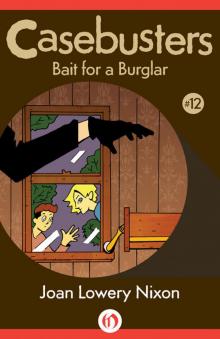 Bait for a Burglar
Bait for a Burglar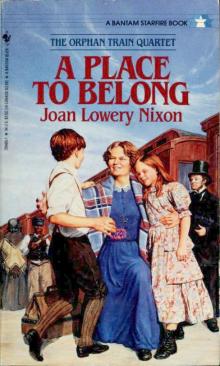 A Place to Belong
A Place to Belong Nightmare
Nightmare Sabotage on the Set
Sabotage on the Set The Other Side of Dark
The Other Side of Dark Whispers from the Dead
Whispers from the Dead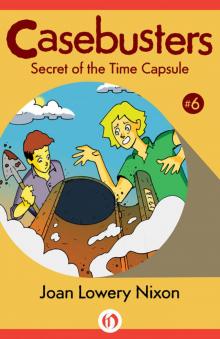 Secret of the Time Capsule
Secret of the Time Capsule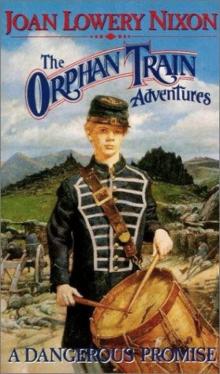 A Dangerous Promise
A Dangerous Promise Laugh Till You Cry
Laugh Till You Cry Spirit Seeker
Spirit Seeker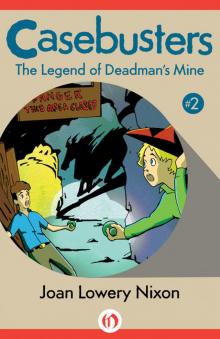 The Legend of Deadman's Mine
The Legend of Deadman's Mine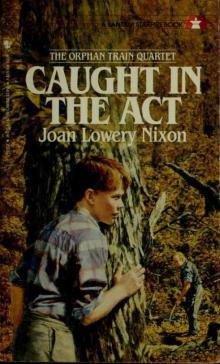 Caught in the Act
Caught in the Act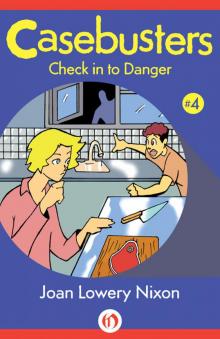 Check in to Danger
Check in to Danger Ellis Island: Three Novels
Ellis Island: Three Novels The Name of the Game Was Murder
The Name of the Game Was Murder The Haunting
The Haunting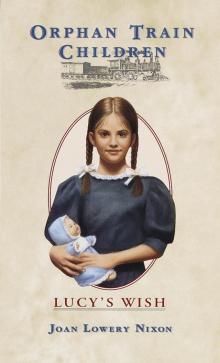 Lucy’s Wish
Lucy’s Wish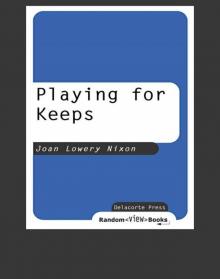 Playing for Keeps
Playing for Keeps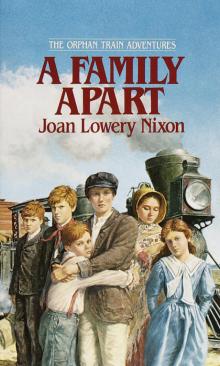 A Family Apart
A Family Apart Nobody's There
Nobody's There Shadowmaker
Shadowmaker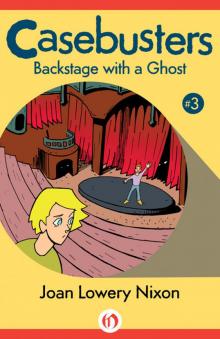 Backstage with a Ghost
Backstage with a Ghost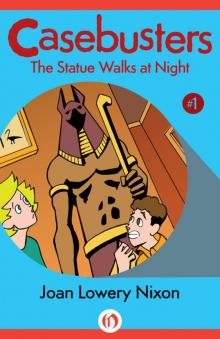 The Statue Walks at Night
The Statue Walks at Night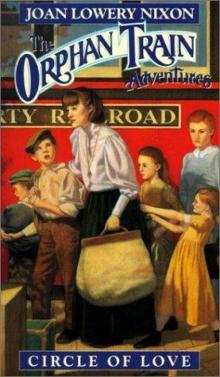 Circle of Love
Circle of Love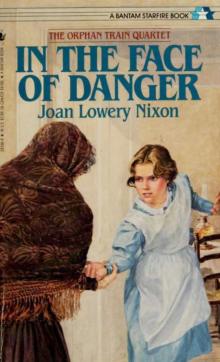 In the Face of Danger
In the Face of Danger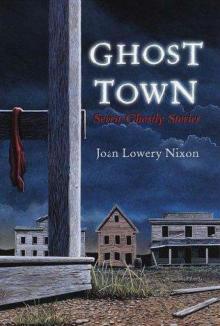 Ghost Town
Ghost Town A Candidate for Murder
A Candidate for Murder The Weekend Was Murder
The Weekend Was Murder The Island of Dangerous Dreams
The Island of Dangerous Dreams The Ghosts of Now
The Ghosts of Now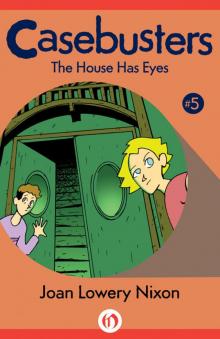 The House Has Eyes
The House Has Eyes The Dark and Deadly Pool
The Dark and Deadly Pool Keeping Secrets
Keeping Secrets Secret, Silent Screams
Secret, Silent Screams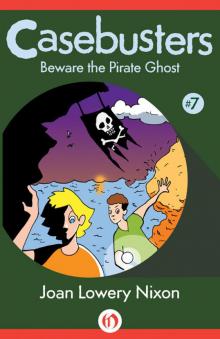 Beware the Pirate Ghost
Beware the Pirate Ghost Search for the Shadowman
Search for the Shadowman Haunted Island
Haunted Island